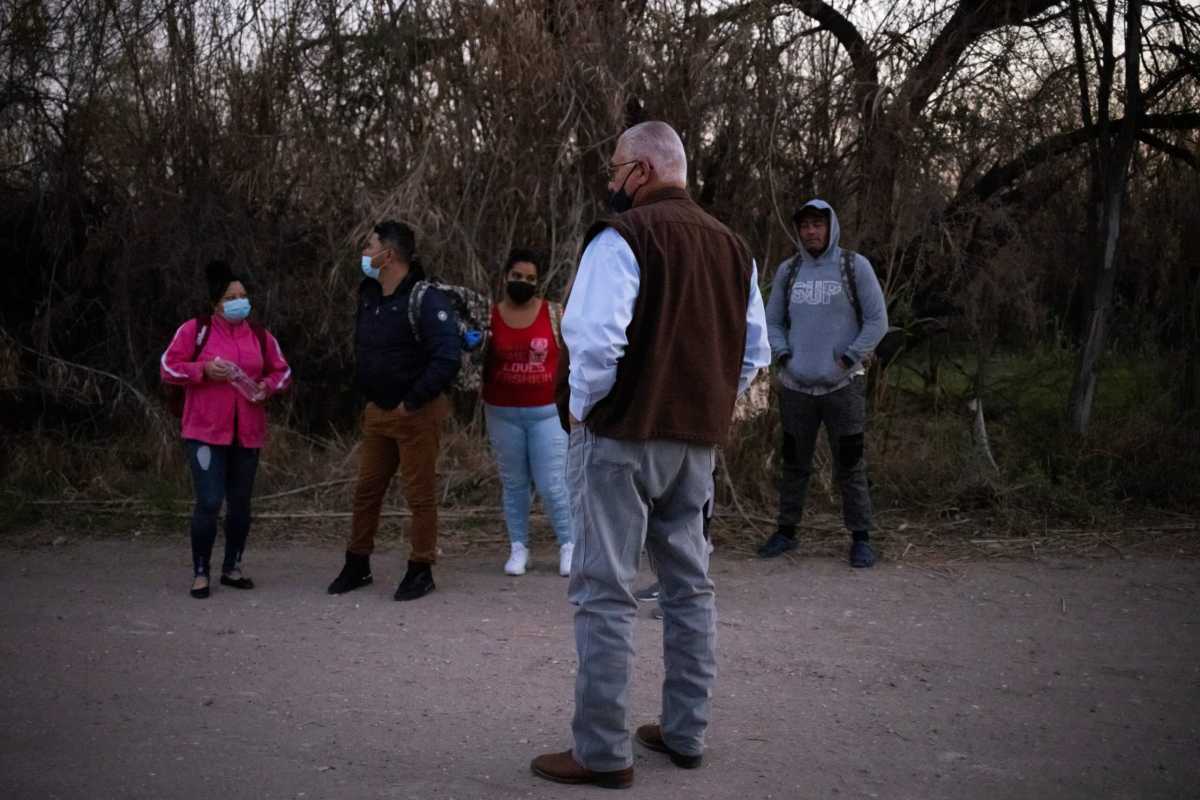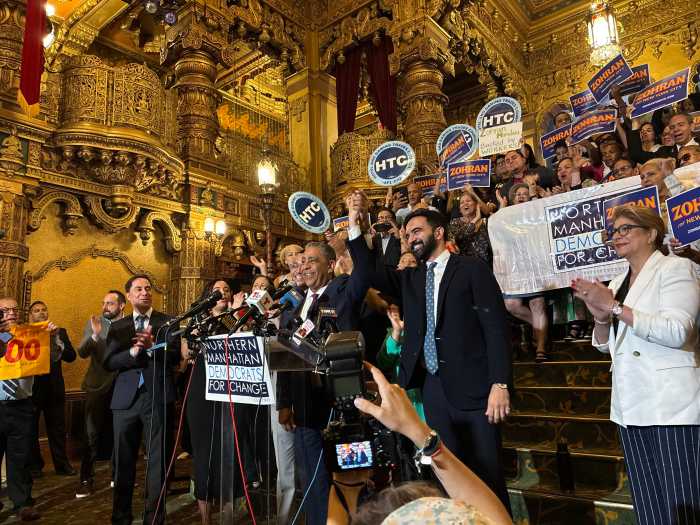By Mimi Dwyer, Reuters
Sheriff Joe Frank Martinez is worried.
More migrants are crossing the U.S.-Mexico border near Del Rio, Texas than Martinez recalls in his 13 years as Val Verde County Sheriff. They wade across the Rio Grande river and into residents’ yards.
But it is members of his own community that have Martinez most concerned.
Last month, he said, a resident fired his gun to scare a group of migrants walking on the outskirts of town; nearby schools were locked down in response. He said unfounded accusations have spread on social media blaming migrants for crimes like break-ins. And at a recent community meeting, Martinez said, a resident asked him if she could use “deadly force” to stop migrants who step onto her land.
“Something like that happens, you got a different situation on your hands,” Martinez said.
Tensions are rising in Del Rio, a city of 35,000, as the nation once again grapples with an increase in migrants seeking entry into the United States. In the area around Del Rio alone, border agents have made more than 68,000 apprehensions so far this fiscal year, according to U.S. Customs and Border Protection (CBP). That figure is four times larger than the number recorded over the same period last year.
The influx has created a humanitarian and political challenge for President Joe Biden, who has vowed to treat migrants more humanely than his predecessor Donald Trump. The Biden administration has allowed children traveling alone and some families with kids to enter the United States to claim asylum. But it is still applying a Trump-era measure that calls for many unauthorized border crossers to be expelled.
The strains are evident in Del Rio, perched on the border about 150 miles west of San Antonio. Martinez and other long-time residents say some in this 85% Hispanic community are showing increased hostility towards migrants.
Shifting local and national politics play a role, they said. Val Verde County went for Trump by a ten-point margin in 2020, the first Republican presidential candidate to win here since Texas native George W. Bush in 2004.
Some voters approved of Trump’s hard-line stance on immigration. A good number of residents work for CBP or at nearby Laughlin Air Force Base. And while the city is thoroughly bilingual and bi-national, locals are not as used to seeing large groups of people from countries like Haiti, Cuba and Venezuela that have crossed here in recent weeks.
Del Rio has a single facility to care for migrants. It served 2,070 people in March, the highest-ever monthly total, according to operations director Tiffany Burrow. Virtually all move on to somewhere else to await the outcome of their asylum claims, she said.
The center, Burrow said, feels more exposed than in the past. Some locals have taken to idling their cars outside, filming migrants on their phones and posting the videos on social media – something Burrow says isn’t making her job any easier.
“It’s putting on a spectacle,” she said. “I don’t want it to be like that. We have a mission to accomplish,” which she said is getting migrants on their way as soon as possible.
ARMED RESIDENTS
Del Rio entered the spotlight of the U.S. immigration debate in February, as Texas weathered a massive winter storm and power outage. Mayor Bruno Lozano called out Biden in a Facebook video.
“We do not have the resources available to house and accommodate these migrants within our community,” said Lozano, 38. He also expressed concern that border-crossers could carry the coronavirus, potentially putting residents at risk.
The video went viral as Lozano – a Democrat who made headlines following his 2018 election as the city’s youngest and first openly gay mayor – took a stance in sync with many pro-Trump Republicans. Invitations from conservative media quickly followed. Lozano made multiple March appearances on the Fox network, and Del Rio was portrayed in right-leaning outlets as being overrun.
The White House declined to comment on the mayor’s assertions, referring Reuters to the Department of Homeland Security and CBP. CBP said it “continues to work with local, state and federal entities to manage immigration issues in our border communities.”
Lozano grew up in Del Rio and told Reuters he remembers his father giving migrants sodas on their ranch outside town when he was young. “The difference between that and now is that now you see hordes of people,” he said.
Del Rio has always had some degree of illegal crossings, but this year is exceptional. The apprehensions in the sector so far this fiscal year already outpace the total for all of fiscal 2019, the last time migration spiked significantly at the border.
For some residents, the perception is that the situation is out of control.
Martinez, the sheriff, last month met with members of the community who live on Vega Verde Road, a strip of houses outside town along the banks of the Rio Grande. Residents were panicked about the migrants they had seen crossing.
Diane Schroeder, 65, a grandmother whose trucker husband is often out of town, asked Martinez the question that concerned him: If a migrant crossed onto her property, could she use deadly force? The sheriff told her she could wind up in jail and that she should call 911 instead.
Schroeder told Reuters she just wanted to know her rights. Hours after that March 20 gathering, she said two migrants crossed her property while she was drinking a beer in her yard with friends. Schroeder said her husband grabbed his rifle, and she ran for her pistol while she called CBP and the sheriff’s office. CBP eventually apprehended the men nearby, she said. CBP told Reuters it “often” encounters migrants in the Vega Verde area, but did not respond to specific queries about the incident.
Schroeder said she and her husband have installed security cameras and floodlights, and she has taken to wearing her handgun when she gardens or takes a walk.
“I’m not afraid to shoot,” she said. “If I had to, I would.”
In response to the gunshots that prompted the school lockdowns last month, a 17-year-old was arrested and charged with disorderly conduct and possession of a controlled substance, according to the Del Rio Police Department. The city said in a March 30 statement that a resident may have fired the shots to “scare off” migrants in the area.
Martinez, the sheriff, worries things might escalate.
“You gonna take somebody’s life because they want a sandwich, or they want a bottled water, or they want to use a phone?” Martinez said. “It just don’t make no sense.”
STRETCHED THIN
Oriana Fernandez, economic development director for Del Rio, said the community was already dealing with enough challenges before the current drama over migration.
The February unemployment rate in Val Verde County was 7.6%, up from 4% in February 2020, government statistics show. Coronavirus-related border restrictions have hit hard in a city whose fortunes are inexorably linked to Ciudad Acuña, the Mexican city across the border that is five times Del Rio’s size. Del Rio depends on revenue from Mexican consumers as well as tolls collected at the international bridge when cars, trucks and pedestrians cross – what Fernandez calls the city’s “golden goose.”
About a mile from Del Rio’s border fence, a low-slung building houses the migrant shelter operated by the Val Verde Border Humanitarian Coalition. The bare-bones center has no permanent beds or kitchen. Meals come from a Salvation Army food truck.
Until recently, the facility flew mostly under the radar, said Burrow, the operations director. The uptick in arrivals and the mayor’s viral video have changed that.
Still, she understands his perspective. “He’s looking at, what can we supply, what are our resources, and how much can we give?” she said. “And there’s a limit.”
Volunteer Lupita De La Paz said she comes in part because she is a first-generation Mexican-American. Facebook in Del Rio has been particularly cruel of late, she said, with posts railing about migrants being rotten parents for dragging their kids on a dangerous journey.
De La Paz said she avoids discussing her volunteer work with members of her own family who oppose this current crop of migrants.
“I think we sometimes forget where we come from,” she said.






































